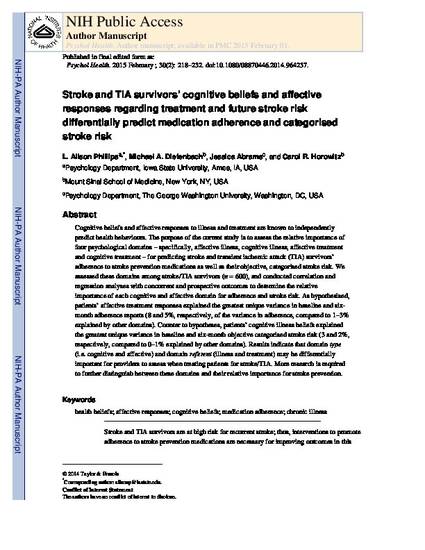
Article
Stroke and TIA survivors’ cognitive beliefs and affective responses regarding treatment and future stroke risk differentially predict medication adherence and categorised stroke risk
Psychology & Health
Document Type
Article
Disciplines
Publication Version
Accepted Manuscript
Publication Date
2-1-2015
DOI
10.1080/08870446.2014.964237
Abstract
Cognitive beliefs and affective responses to illness and treatment are known to independently predict health behaviours. The purpose of the current study is to assess the relative importance of four psychological domains – specifically, affective illness, cognitive illness, affective treatment and cognitive treatment – for predicting stroke and transient ischemic attack (TIA) survivors’ adherence to stroke prevention medications as well as their objective, categorised stroke risk. We assessed these domains among stroke/TIA survivors (n = 600), and conducted correlation and regression analyses with concurrent and prospective outcomes to determine the relative importance of each cognitive and affective domain for adherence and stroke risk. As hypothesised, patients’ affective treatment responses explained the greatest unique variance in baseline and six-month adherence reports (8 and 5%, respectively, of the variance in adherence, compared to 1–3% explained by other domains). Counter to hypotheses, patients’ cognitive illness beliefs explained the greatest unique variance in baseline and six-month objective categorised stroke risk (3 and 2%, respectively, compared to 0–1% explained by other domains). Results indicate that domain type (i.e. cognitive and affective) and domain referent (illness and treatment) may be differentially important for providers to assess when treating patients for stroke/TIA. More research is required to further distinguish between these domains and their relative importance for stroke prevention.
Copyright Owner
Taylor & Francis
Copyright Date
2015
Language
en
File Format
application/pdf
Citation Information
L. Alison Phillips, Michael A. Diefenbach, Jessica Abrams and Carol R. Horowitz. "Stroke and TIA survivors’ cognitive beliefs and affective responses regarding treatment and future stroke risk differentially predict medication adherence and categorised stroke risk" Psychology & Health Vol. 30 Iss. 2 (2015) p. 218 - 232 Available at: http://works.bepress.com/lalison-phillips/6/

Published in final edited form as: Psychol Health. 2015 February ; 30(2): 218–232. doi:10.1080/08870446.2014.964237.